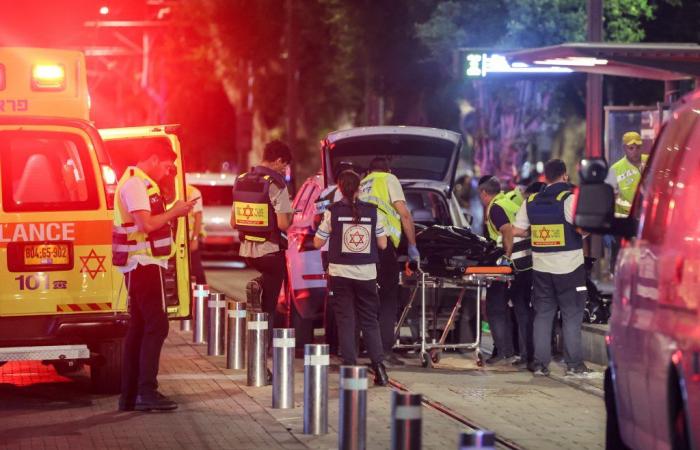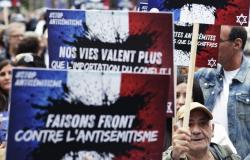“We have witnessed a growth in racial discrimination against us as Arabs since the beginning of the war…it has increased exponentially,” says Aya, a young woman in her thirties, who lives in the city of Haifa in northern Israel, and lives with her husband and infant child in a mixed-religious and nationality neighborhood in the city overlooking the Mediterranean Sea. For years, it has been a model of coexistence between Arabs and Jews.
For Aya, Haifa has always been a peaceful city, a place for different ethnicities, religions, and diversity of political opinions, without anyone attacking the other because of their intellectual and national differences. However, the war in the Gaza Strip and the accompanying military escalation on several fronts in the West Bank, Jerusalem, and on the northern border “changed that.” “Things have not been the same since October 7 last year.
On this date, Hamas and other armed Palestinian factions launched a bloody attack on the settlements surrounding the Gaza Strip, calling it the “Al-Aqsa Flood.”
The attack led to the deaths of 1,205 people, most of them civilians, according to an Agence France-Presse count based on official Israeli figures. The victims included hostages who were killed while being held in the Gaza Strip, and they were among 251 hostages kidnapped that day from southern Israel.
In response to the attack, Israel pledged to “eliminate” Hamas. Since then, Israeli military operations and the continuing violent bombardment of the Gaza Strip have killed more than 41,400 people, most of them civilians, according to the Hamas Ministry of Health.
According to the Central Bureau of Statistics in the Palestinian Territories, during a full year of war, 41,825 people were killed in the Gaza Strip, including 16,891 children and 11,458 women, while 742 people were killed in the West Bank, including 160 children.
Among the victims of the war in Gaza, 174 press crews, 986 medical staff, 203 workers at the United Nations Relief and Works Organization for Palestine Refugees (UNRWA) and 85 civil defense crews were killed, according to central census data.
There are still 10,000 missing people in the Gaza Strip, about half of whom are children and women.
Long months of negotiations mediated by the United States, Qatar, and Egypt did not succeed in stopping the war. A few days ago, the confrontation between Hezbollah and Israel escalated, and warnings of a combustion in the Middle East intensified.
Reports: Arrests and trials of opinion leaders in Israel and the occupied Palestinian territories
The Washington Post shed light on the justice system in Israel currently, specifically after the Hamas attack on October 7, explaining that the freedom of expression of Israeli citizens of Palestinian origin is being suppressed.
Haifa.. “Racism and fear”
Last June, an Agence France-Presse report stated that the Arab minority, which constitutes 20 percent of the total population of Israel, is under great pressure due to the increase in hate crimes and the “unfair” procedures of the Israeli police, according to local human rights organizations.
The Legal Center for Arab Minority Rights in Israel (Adalah) said that between October 7 and March 27, the police “arrested more than 400 Arab people on charges related to expression, which the police say amount to incitement to terrorism.”
He added, “The crackdown on freedom of expression has created a situation in which Arabs in Israel cannot protest or express their opinions freely.”
Aya, who has almost daily contact with Israeli Jews, and lives in a mixed neighborhood, tries for the aforementioned reasons to distance herself from political discussions or express her sympathy for the people of Gaza through social networking sites. She says, “I have a child…”, but she is not immune from “racist provocation.” “As you describe it.
Al-Hurra website talks about many situations she went through while she was with her infant, whether inside the pediatric clinic or the park near her home where she took her child to play. She says, “The voices of the Jews around me get louder as soon as they hear me speaking Arabic with my son, either by sternly addressing news related to October 7 or the assassination of Palestinian figures, or by singing in a loud, provocative voice.”
She avoids responding in the face of similar manifestations that have been repeated in her life throughout the year of war, and with a burning sensation in her voice that comes through WhatsApp audio messages, we hear next to her the murmurs of her young child when she says, “I had to leave the children’s garden after a Jew sang a song with racist lyrics against Arabs next to me and directed his glances at me and my son.” “.
In the most recent incident that Aya narrates, her Jewish neighbor in the neighborhood inhabited by many Arabs lit celebratory songs after ten at night, when the assassination of Hezbollah Secretary General Hassan Nasrallah was announced, and sang with her loudly. “My child went to bed at eight in the evening. That night, he woke up several times, and she spent two hours singing and turning up the music volume, without any of us objecting.”
“This is our land, your place is not among us…it is not your country.” Messages she receives in conversations with Jews who “provoke” Aya. She says, “I am fluent in Hebrew, but of course, no matter how good my language is, they recognize that I am Arab,” describing what she is exposed to by the Jews as “aggressive” behavior. “This is something that was not witnessed before the war in Haifa.
Aya describes the beach city that is home to the Baha’i Temple, which is listed on the UNESCO World Heritage List: “Before the war in Gaza, the people of Haifa were more inclined towards peace, mixing between Jews and Arabs and different nationalities and races without anyone being exposed to the other, as everyone had their own political opinions and religious beliefs apart from that.” About violence and racism, but racism appeared in a very, very double way.”
The longer the war lasts, the greater its negative impact on the lives of Arabs in Israel, says Aya.
Israeli Arabs are being persecuted or expelled because of posts about Gaza
A number of Israeli Arabs and Palestinians in occupied East Jerusalem were expelled from work, university, or imprisonment due to posts on social media sites in solidarity with the Gaza Strip, in light of the ongoing war between Hamas and Israel for 13 days, according to testimonies and statements by the Israeli police.
Daliat al-Karmel…a “complicated” relationship
The town of Daliyat al-Carmel belongs to the city of Haifa, and is located in its southeast. It includes archaeological sites that are particularly attractive to domestic tourism, and is distinguished by the presence of the largest concentration of the Druze community there.
In her interview with Al-Hurra website, Hadin Saleh (33 years old) tries to describe the reality of Daliyat al-Carmel, to which she belongs after the war. She suffices with the word “complicated,” in reference to the controversial relationship between the Druze and the Israeli government in relation to the Arab minority or to the Palestinians residing in the West Bank and Jerusalem.
Hadin points out that she leans toward her Palestinian roots and takes a “cautious” stance in dealing with Jewish Israelis, so she speaks Arabic most of the time despite her mastery of the Hebrew language, and also focuses her friendships on Arabs, which is “unusual” for the geographical area in which she lives.
Hadin works in a “supermarket” that is visited daily by many Jews, especially those who go to Daliyat al-Carmel for the purpose of tourism. She speaks Hebrew to them, but as soon as she starts speaking in Arabic with other Arab customers who live in the area, then attention turns to her.
Al-Hurra gives an example: “After the war, I began to witness a lot of racist attitudes. For example, I was speaking to a veiled customer in Arabic, and another Jewish customer stared at her for an uncomfortable long time for both of us, but I did not stop speaking in Arabic, and at the same time I did not express He relieved us of our inconvenience to avoid problems.”
She points out that some Jews also used to keep a cautious distance from her just because they heard her speaking in Arabic, and then when they learned that she was Druze, their fear diminished. “They were reassured and reminded that we were together, especially since many Druze were integrated into military service.”
At the beginning of the war, Hadin participated in a demonstration sympathetic to the civilian victims in the Gaza Strip, but she did not repeat the matter, and she does not even discuss her political opinions with many of her acquaintances, because her concern is not only with the Jews, but also with the Arabs who support the Israeli government and the war in Gaza.
She describes this war as “revealing many faces, even those who claimed to be leftists,” indicating that what she describes as racial discrimination against Arabs appeared in the dealings of the “majority” of Jews with whom she dealt.
Hadin told Al-Hurra that she sees the Jews’ treatment of her and the people of her town as “superior.” “They make us feel that we are of the lowest level, no matter how excellent your Hebrew language is. And that we must always offer thanks and gratitude for the fact that we live in the State of Israel because it provides us with safety and everything.” something..”.
“Even national service has become as if everyone is forced to do it, because without that you will face difficulties in finding job opportunities,” Haddin adds.
National service in Israel is considered voluntary work as an alternative to military service in the Israeli army, for those who have obtained an exemption from it or who belong to the Arab minority. It is implemented in government offices affiliated with the Ministry of Education, Welfare, Justice, Health, Economy, and others, in exchange for a monthly financial wage or donations for education or housing in the event of completion of the full two-year service period. However, many Arabs refuse this service.
Last July, the non-profit organization Musawa documented an increase in human rights violations against the Arab minority in Israel since October 7, 2023, which include arrests, discrimination at work, and harassment in schools, in addition to restrictions imposed on the right to protest.
The “campaign” website monitored 590,000 violent conversations in Hebrew on the X, Telegram, and Meta platforms, according to a statement by its director, Nadim Al-Nashif, published by Agence France-Presse last August.
Among the observed publications were calls for a “second Nakba” and for the “killing” or expulsion of Palestinians.
How does the war in Gaza put pressure on Israeli Arabs?
The war in Gaza is putting increasing pressure on the Arabs of Israel. Students and workers are exposed to dismissal and investigation due to judicial prosecutions, and riots and confrontations occur that sometimes end in arrests, in a country where they constitute a minority, according to testimonies collected and viewed by the Al-Hurra website.
Jish.. The voice of the “Northern Front” is heard
While all the Jewish towns in northern Israel have been emptied of their residents, and the goal of the military escalation that has been taking place since last September against Hezbollah and its strongholds in southern Lebanon and the southern suburbs of Beirut is to return 70,000 displaced Israelis, the people of the Arab border towns have not left their camps.
Talin, a young woman in her twenties, lives in one of them, the village of Jish, adjacent to the border between Israel and Lebanon.
She summarized to Al-Hurra website the effects of the war on her as “psychological harm”, which made her commit to her village and leave her job in Tel Aviv about a year ago, and she even seriously considered immigrating outside of Israel.
The emptiness of the Jewish towns close to the army made it impossible to direct contact between Jews and Arabs in the border areas with Lebanon, but since the beginning of the ground invasion of southern Lebanon, Talin says, “I hear the sound of shells fired by the Israeli army from the time they leave until they reach Lebanon…”
Before describing her suffering from lack of sleep and feeling “pain” because she “knows the deaths and destruction that these shells and raids cause in southern Lebanon,” she says, “What I feel is not suffering… There are people who die every day.”
The escalation between Israel and Hezbollah since October 8, 2023, has left 2,036 people dead in Lebanon, and about 9,653 wounded.
Since the escalation last September, about one million people have been displaced inside Lebanon and more than 250,000 have crossed Syria, as the United Nations said, in addition to more than 5,000 Lebanese taking refuge in Iraq, according to official figures from the host country.
Talin continues: “I cannot stay in this country. I cannot deal with a person if he supports the war or participates in it. It is very difficult and psychologically harmful.”
Is there a fear of the effects of the war with Hezbollah, due to your geographical proximity? “Yes,” Talin says, pointing to the presence of military convoys near their town, and the absence of shelters, whether inside homes or in public, which makes it far from reach after any siren, due to the old construction of the homes.
At the same time, Tallinn adds, “But my family experienced the 2006 war, and there are few mistakes that lead to missiles or missiles from both sides reaching the army.”
In reference to the effects of the war in Gaza, Talin believes that social media sites “played a major role in informing her of news that is absent from, for example, the Hebrew media,” adding, “The old generation adheres to traditional media, but the correct news is in social media,” as she put it.
In an interview with Agence France-Presse with Ahmed Tibi last June, he said that the Israeli police “pursued hundreds of Arab citizens because they wrote an article or story that sympathized with the children of Gaza or said no to the war.”
But he still has hope that “Jews and Arabs will be able to rebuild bridges,” adding, “I am a realist but always optimistic, because I am on the right side of history,” as he put it.
He added that if the war in Gaza ends, “democracy is the only way” to resolve the crisis with the establishment of a Palestinian state with full rights.





